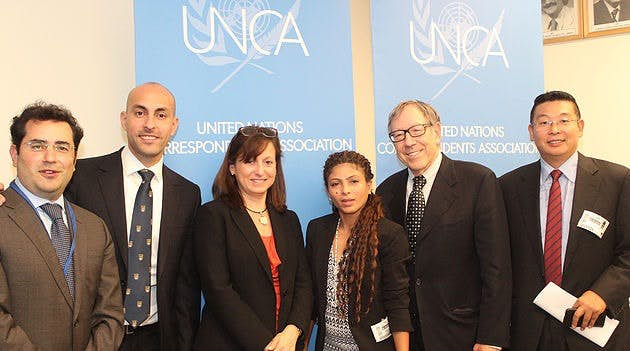Governments seeking election to the U.N.’s top human rights body this year include China, Cuba, Egypt, Iraq, Malaysia, Russia, Rwanda, and Saudi Arabia. Earlier this month, HRF and UN Watch hosted a series of events at the Parliament of Canada in Ottawa and at the U.N. Headquarters in New York denouncing the bids placed this year by authoritarian states to sit on the council.
“It is deplorable that the U.N. will soon entrust the protection of the world’s human rights to some of the worst dictatorships and authoritarian regimes on the planet,” said HRF president Thor Halvorssen. “Just a decade after its founding, the council today reveals the same symptoms of hypocrisy, double standards, and gutlessness displayed by the discredited Human Rights Commission that preceded it. Democracies at the U.N. must raise their voices against authoritarian states that employ its bully pulpits to silence their human rights victims and deflect attention. To do otherwise is to side with the oppressors,” he added.
On October 6, HRF and UN Watch presented a joint report at the U.N. Correspondents Association that analyzes this year’s candidates. The report assesses the suitability of each candidate based on a two-pronged analysis of selection criteria developed by the U.N. General Assembly in 2006. The report concludes that eight of the 17 candidate states are not qualified to serve at the UNHRC given their poor records of domestic human rights protection and their negative U.N. voting records. The eight countries identified in the report as unfit are China, Cuba, Egypt, Iraq, Malaysia, Russia, Rwanda, and Saudi Arabia.
The HRF press briefing included testimony from Saudi human rights activist and wife of Raif Badawi, Ensaf Haidar; Chinese dissident and Tiananmen Square survivor Dr. Yang Jianli; Cuba Archive Truth and Memory Project executive director María Werlau; and former member of the Canadian Parliament and former Minister of Justice Irwin Cotler.
At the Parliament of Canada in Ottawa, Jianli asked all democratic nations to cast a “No” vote for China’s candidacy. He emphasized that “if every democracy says no, China would have no chance [at getting elected] … Electing China to the Human Rights Council is like picking the fox to guard the henhouse while he is still wiping feathers off his mouth from his last meal.” Contributing her thoughts on Cuba’s candidacy, Werlau stated that “Cuba should not be part of the council … because it’s a totalitarian state that violates — in its laws and practices — essentially all applicable articles of the Universal Declaration of Human Rights.”
“According to UNGA Resolution 60/251 that established the council, candidates for the 47-member body must ‘uphold the highest standards in the promotion and protection of human rights,’ so electing China, Cuba, Egypt, Iraq, Malaysia, Russia, Rwanda, and Saudi Arabia, would be in violation of international law,” said HRF chief legal officer Javier El-Hage. “The likely election of these eight human rights violators would permit them to hide their abuses behind the cloak of U.N. legitimacy. Once part of the council, these regimes typicallystifle any attempts to investigate their abuses,” he added.
Human Rights Foundation (HRF) is a nonpartisan nonprofit organization that promotes and protects human rights globally, with a focus on closed societies.
Read HRF and UN Watch’s joint report on this year’s candidates for the UNHRC here.
Contact: Noemi Gonzalo-Bilbao, (212) 246-8486, noemi@humanrightsfdn.wpengine.com.
